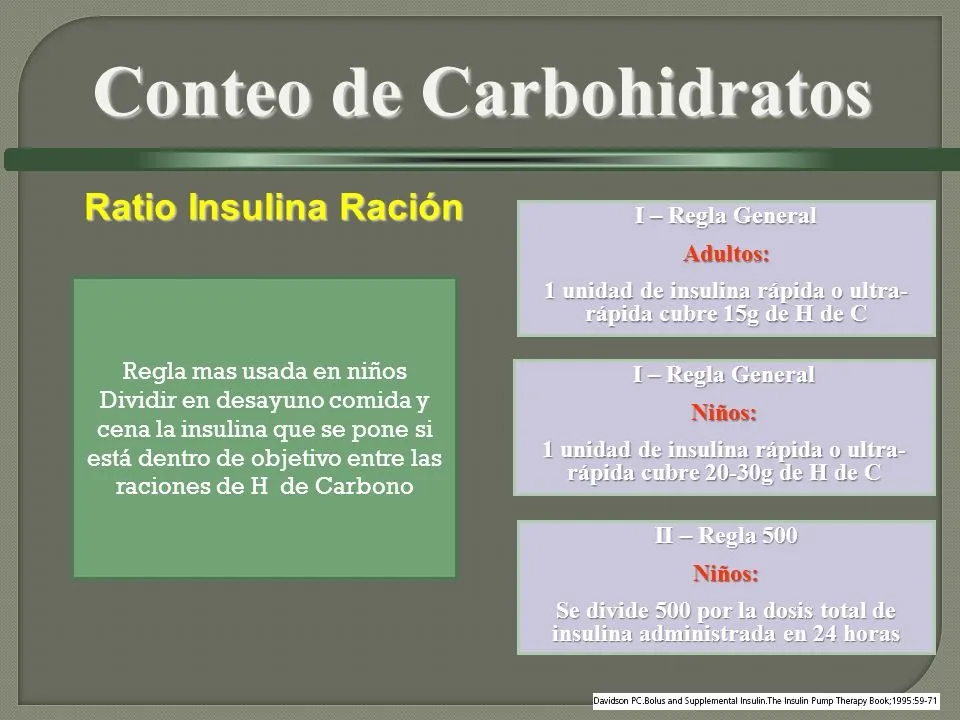Dido
07/14/2019 11:30 a.m.
Hello, I know that this question is a bit basic, but I am a lad type and so far it has done well, but I think that my sensitivity values etc, the other two values have been moved, as the sensitivity is calculated and asThe extra insulin is calculated to inject the controls, I am reviewing notes etc., but the ratio in an amount choks me.
It could be for example: if as 3 portions at breakfast and I put 4 of fast insulin, as would be 4 of insulin/3 recits that would give me 1.3.that is, reclaus is insulin/ among the streams you eat, and that value is your ratio?
Thank you very much for answering.
No signature configured, add it on your user's profile.
Yes, the ratio is calculated by dividing insulin between the portions;As in your example.
Although for the most advanced it is also calculated by dividing the grams of HC between insulin.
No signature configured, add it on your user's profile.
Do not confuse sensitivity factor and insulin ratio:
Sensitivity factor: Divides 1800 for all the insulin you wear in one day.
Example:
You use 30 fast
20 slow
Total = 50
1800/50 = 36.
Sensitivity factor would be 36, that is, an insulin dose reduces 36 mg/dl
Ratio is what you need to reduce an HC ration.It is the calculation you have made, which gives you 1.3.
Greetings.
No signature configured, add it on your user's profile.
Hello, how are you, well I have a similar problem, have.
My sensitivity factor I have.
4+6+6+44 = 60
1800/60 = 30 My sensitivity is 30 is what burns me 1 unid of insulin, ok perfect,
Now, how much do we have rations to get the ratio, as you say the rations, if I eat 2 portions at breakfast, plus 6 at lunch, and 1 in snack and 6 at dinner and in the right 1 ration we are talking about 16 rations to theday, say a 2,000kl diet,
Well, if I want to get the ratio of each ration, as is done.I have been diabetic years but this is all new for me because when I started with diabetes there were not as many things as today, that I must do.
Please, please give me an example, to be able to carry out the ratio that I need.As for the hydrates that I eat every day
No signature configured, add it on your user's profile.
R. Breakfast = 4/2 = 2
R. Lunch = 6/7 = 0.86
R. Dinner = 6/7 = 0.86
No signature configured, add it on your user's profile.
For 2 rations at breakfast you say that you get 4 units, the ratio is 4/2 = 2.
In food: 6/6 = 1, and at dinner the same.
This without counting fat and proteins.
I use the sensitivity factor to lower glucose if I have been high after a meal.For example, at 2-3 hours I am 178mg/dl, I know that with 2 units I will go down to about 85-90 other days I will stay in 130 according to my hormones.My factor is around 50mg/dl, but for accounts I get 72mg (1800/25).
Lada enero 2015.
Uso Toujeo y Novorapid.
Hello!I share a little information:
The sensitivity factor or correction factor is a calculation that will help us determine the amount of insulin dose necessary forCorrect blood glucose before or after meals, regardless of carbohydrate intake.To take it out, all the insulin doses of the day (24 hours) must be divided by 1800.The result will be our insulin sensitivity factor.
In case we should correct ourselves before eating, it will be necessary to calculate the insulin units to correct (sensitivity factor) + insulin units to cover the food (ratio)
The ratio of insulin, is the amount of insulin to be injected by certain grams of carbohydrates.To know it, we have to apply the knowledge of the insulin ratio that varies according to each person: 1 ration is usually equal to 10 gr or 15 gr of carbohydrates.Then, to cover a ration, 1 (one) insulin unit will correspond.In my case, my ratio is 1U every 15 gr of carbohydrates, so if my ration is 45 gr of carbohydrates I will need to apply 3 units to cover it.
If blood glucose at two hours of food generates hyperglycemia, there is some calculation that we have to adjust.If the glycemia were normal before eating, and after the food they got out of control, it is because the carbohydrate insulin ratio was very low.If it happens backwards, and there are hypoglycemia, it is because the ratio was very high.
It is important to consider that the ratio is not always the same throughout the day, it can change to the early hours of the day, in the afternoon, and at night according to the time we eat, the physical activity we do, even the timeof the day we apply slow insulin.That will depend on each one, to adjust the doses to our needs.For example, a person can have a ratio of 1 U during the morning, while in the afternoon he continues with a ratio of 0.5 U of insulin by ration.
I hope my contribution serves, greetings !!
@Jesus Pino
✾ Diabética tipo 1 desde marzo 2018 ✾
Lantus 16u por la noche, Humalog según cantidad de Hdc
Actividad física tres veces a la semana
Sensor Abbott cuando puedo. Última HbA1c: 6.1%
Hello
I don't know if I do something wrong with the calculation of the so -called "sensitivity factor"
I put 4 u.Slow and fast 3+4+2 (= 9 in total day)
That is sensib factor = 1800/13 = 138!
But I have proven that to make corrections 1 u.Fasting me between 50-60 mg.
Something weird in my calculations?
By the way, what I call insulin factor (what you call ratio) for me is at the breakfast of 0.8 (4 be and 3 u.insulina) and both in food and 1.0 dinner (4 be/4 u;
all the best
DM1 desde Marzo 2018 (53 años). 7-10 unidades basal: Abasaglar (insulina glargina). NovoRapid. Factor 1.0/1.5.
Vivo en Alemania. CarboH total dia 70-80 gr. Deporte Gym todos dias L-V 1h-2 h
HbA1c 5,5% (Abril 2022)
Dexcom G6
Link
@jldiazdel effectivamemte the theory says that, what happens is that your dose of slow insulin is very, very low I understand that because you have been very little time with diabetes and your pancreas still generates insulin and because as you have commented once, you do a lot of weekly weekly weekly weekly.- In your case this calculation of the sensitivity factor I do not think it serves as much until you finish the honeymoon and go need more basal insulin.-
No signature configured, add it on your user's profile.
Yes, it will probably be that.
Thank you !And also for the link
DM1 desde Marzo 2018 (53 años). 7-10 unidades basal: Abasaglar (insulina glargina). NovoRapid. Factor 1.0/1.5.
Vivo en Alemania. CarboH total dia 70-80 gr. Deporte Gym todos dias L-V 1h-2 h
HbA1c 5,5% (Abril 2022)
Dexcom G6
Excellent the forum feeds one of many congratulations.
No signature configured, add it on your user's profile.






